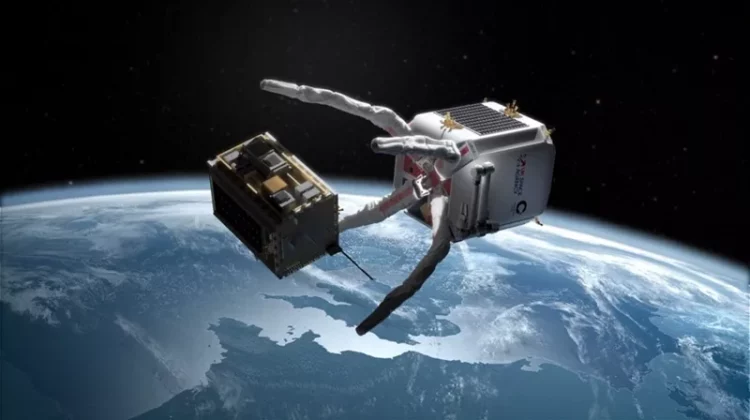
The UK Space Agency has awarded two UK-based companies, ClearSpace and Astroscale, a total of £4million to design missions with a consortium of industry partners to clear up space debris. Once the designs are complete, the teams, along with other UK space companies, could receive further funding to see the UK’s first national space debris removal mission launch in 2026.
Orbital congestion and space debris are among the biggest challenges facing the global space sector and the UK Space Agency has committed £102million, over the next three years, to deliver capabilities to track objects in space and reduce debris. The UK is also leading on global regulation and standard setting to make space activities more sustainable, in line with the government’s National Space Strategy.
There are estimated to be more than 130 million pieces of space debris orbiting Earth, from tiny flecks of paint from spacecraft to old satellites, spent rocket bodies and even tools dropped by astronauts. This debris can stay in orbit for hundreds of years and presents a real danger to satellites and the public services that they deliver, from communications and navigation to environmental monitoring.
‘As our reliance on space technologies increases rapidly and the UK becomes a global hub of satellite design, manufacturing and launch, we are committed to leading efforts to make space more sustainable,’ said Paul Bate, chief executive of the UK Space Agency. ‘With 1,700 satellites launched last year alone, the need to safeguard the space environment for the benefit of everyone on Earth has never been more pressing. By catalysing investment, backing innovative new technologies and supporting a national mission to remove space debris, we can keep space open for future generations and protect the important satellite services that modern life depends on.’
London-based ClearSpace and Astroscale, which is based at the Harwell Space Cluster in Oxfordshire, were chosen after completing feasibility studies earlier this year.
ClearSpace has been awarded £2.25million to conduct the next phase of a study into a mission that would remove derelict satellites from low Earth orbit (LEO). This design phase will last until October 2023 and will finish with the preliminary design review — an evaluation of the progress on the design and the technical adequacy of the proposed mission. The UK Space Agency hopes that the Clearing the LEO Environment with Active Removal (CLEAR) mission will act as a catalyst for the development of commercially viable disposal services and other in-orbit services.
‘Space is getting more and more congested with defunct satellites, rocket bodies and other fragments. We have to act now to ensure this precious environment remains usable for future generations,’ said Rory Holmes, managing director of ClearSpace UK. ‘The CLEAR mission is a vital step on the path to making the removal of space debris a reality, and will allow us to develop state-of-the-art space technologies, such as complex robotics and AI-based algorithms, within the UK.’
Astroscale has been awarded £1.7million to design a satellite servicer that is capable of removing multiple retired or defunct satellites in a single mission. The Cleaning Outer Space Mission through Innovative Capture (COSMIC) will harness Astroscale’s rendezvous and remote proximity operations, and debris-capture capabilities. The COSMIC servicer will be a technological progression of Astroscale’s Sunrise programme ELSA-M servicer – a commercial partnership between the UK Space Agency, the European Space Agency and global satellite operator OneWeb. The ELSA-M multi-client debris-removal space servicer will be launched ahead of the UK’s Active Debris Removal mission in late 2024.
‘Astroscale, working closely with expert UK partner companies, will design a national robotic-capture capability that can safely remove two defunct UK-registered satellites in low Earth orbit,’ said Nick Shave, Astroscale’s managing director. ‘With our proven space mission heritage and strong industrial partnerships, we can deliver the UK government’s ambitious plans to develop a sustainable space economy for the benefit of future generations. Our goal is to make in-orbit debris removal and satellite servicing routine by 2030.’
The projects are expected to directly support the creation of 70 new jobs, with further opportunities to increase growth in the wider UK space sector, which already supports 47,000 jobs and generates an income of £16.5billion each year.



